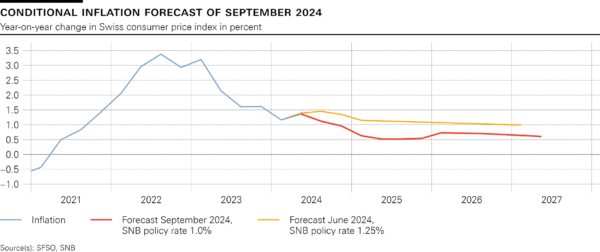The Swiss National Bank is lowering the SNB policy rate by 0.25 percentage points to 1.0%. The change applies from tomorrow, 27 September 2024. Banks’ sight deposits held at the SNB will be remunerated at the SNB policy rate up to a certain threshold, and at 0.5% above this threshold. The SNB also remains willing to be active in the foreign exchange market as necessary.
Inflationary pressure in Switzerland has again decreased significantly compared to the previous quarter. Among other things, this decrease reflects the appreciation of the Swiss franc over the last three months. The SNB’s easing of monetary policy today takes the reduction in inflationary pressure into account. Further cuts in the SNB policy rate may become necessary in the coming quarters to ensure price stability over the medium term.
Inflation in the period since the last monetary policy assessment was lower than expected, standing at 1.1% in August compared to 1.4% in May. Imported goods and services in particular contributed to the decline. Overall, inflation in Switzerland is currently being driven mainly by higher prices for domestic services.
The new conditional inflation forecast is significantly lower than that of June. The stronger Swiss franc, the lower oil price and electricity price cuts announced for next January have contributed to the downward revision. The stronger decline in inflation also means that weaker second-round effects are expected in the medium term. The new forecast is within the range of price stability over the entire forecast horizon (cf. chart). It puts average annual inflation at 1.2% for 2024, 0.6% for 2025 and 0.7% for 2026 (cf. table). The forecast is based on the assumption that the SNB policy rate is 1.0% over the entire forecast horizon. Without today’s rate cut, the conditional inflation forecast would have been even lower.
Global economic growth was moderate in the second quarter of 2024. Inflation in many countries remains above central banks’ targets. However, it has continued to decline in recent months. Various central banks have cut their policy rates as a result.
Inflationary pressure abroad is likely to continue to ease gradually over the next quarters. At the same time, the moderate pace of global growth should continue.
This scenario for the global economy is still subject to significant risks. For example, geopolitical tensions could increase, resulting in weaker development of global economic activity. Equally, it cannot be ruled out that inflation will remain elevated for longer in some countries.
Swiss GDP growth was solid in the second quarter of 2024. Growth momentum in the chemicals/pharmaceuticals industry was particularly strong, while growth in many other industries was moderate. There was a further slight increase in unemployment. The utilisation of overall production capacity was normal.
Growth is likely to remain rather modest in Switzerland in the coming quarters due to the recent appreciation of the Swiss franc and the moderate development of the global economy. The SNB anticipates GDP growth of around 1% this year. In this environment, unemployment should continue to rise slightly, while the utilisation of production capacity is likely to decline slightly. Over the medium term, the growth-dampening effect of the recent appreciation should subside and economic development should gradually improve as a result. The SNB currently expects growth of around 1.5% for 2025.
The forecast for Switzerland, as for the global economy, is subject to significant uncertainty. Developments abroad represent the main risk.
Momentum on the mortgage and real estate markets in recent quarters has been weaker than in previous years. While the vulnerabilities in these markets have receded slightly, they still exist.
More detailed information on the monetary policy decision can be found in the introductory remarks of the Governing Board.
















